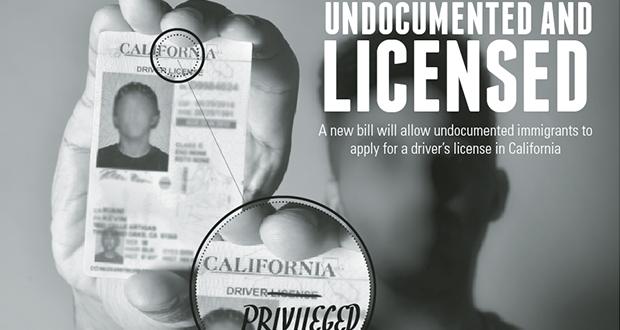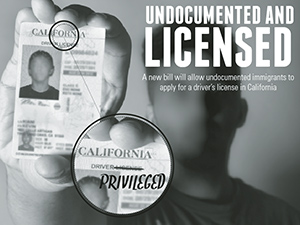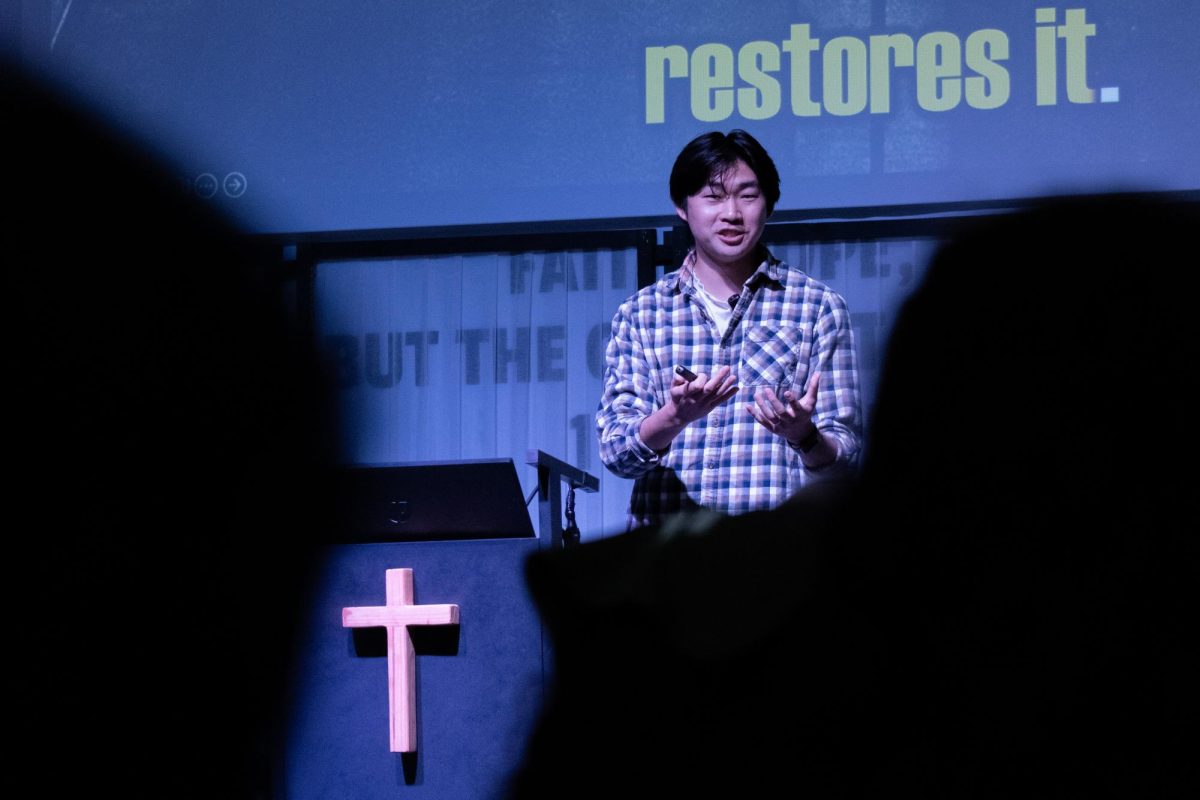
California legislators recently signed AB 60, allowing about 1.4 million undocumented immigrants the right to obtain a California driver’s license.
“My father was stopped and detained for driving without a license and consequently, he was deported,” said David Gonzalez, an 18-year-old undocumented freshman student at CSUN.
Gonzalez who is also a member of Dreams To Be Heard, a group on campus advocating for immigrant rights, said the bill should have been passed a while ago.
“My family and I have been deeply affected by undocumented individuals not being able to have driver’s licenses (so) this bill is long overdue. It’s not perfect, but it’s still good,” he said.
The bill, also known as the Safe and Responsible Drivers Act, was proposed by Luis Alejo (D-Salinas) and is currently waiting to be signed by Gov. Jerry Brown.
“With AB 60 we are recognizing the needs of many hard-working immigrants living here and contributing so much to our great state. And those with driver’s licenses will have more job opportunities available to them, which will boost businesses in the state,” said Alejo in a recent press release.
‘It’s something they need in order to live’
Undocumented immigrants who apply for a California driver’s license but cannot provide a valid Social Security number, Federal tax ID number, or “any other number or identifier determined to be appropriate by the department,” must sign an affidavit at the Department of Motor Vehicles.
However, an individual’s citizenship or immigration status is not allowed to be used for any kind of “criminal investigations, arrests, or detentions.”
Victor Narro, project director for the UCLA Labor Center who specializes in immigration policy, said the bill is a necessity for undocumented immigrants in California.
“You don’t want to put people in a situation where they feel they have to drive without a license illegally just to survive,” Narro said.
Gabriela Castillo, a 25-year-old undocumented junior and childhood and adolescent development major at CSUN, said she will use this bill to not only get her driver’s license, but to finally get a legal form of identification.
“I am an undocumented student and I have not yet received my identification.” Castillo said. “I would benefit from this law because I do drive and being able to obtain a driver’s license would help not only myself, but my family as well.”
Castillo is also hopeful that the bill will help her mother who is also undocumented, not to be fearful to drive anymore.
“My mother does not drive because up until this bill, she hasn’t been able to get a license. By her driving and by her being able to get a license, it would be very helpful and I will feel much better knowing that she is safe on the road,” Castillo said.
Kent Wong, director for the UCLA Labor Center who specializes in undocumented students and immigrant workers said the bill is not only needed here in California, but it will also provide economic growth and safety precautions as well.
“It’s something that they need in order to work and in order to live, but I also think it’s good for society as a whole,” Wong said.
Wong said the bill will also help undocumented immigrants assimilate into society.
“I think its very important for California to acknowledge that immigrants are a crucial part of our economy, that they contribute greatly to our society and that we should do what we can to provide ways for immigrants to fully integrate into our society,” Wong said.
California setting a precedent
Considering that California is only the 10th state to allow undocumented immigrants to obtain drivers licenses, many supporters of the bill believe that AB 60 will be setting a strong example for other states to follow in the same footsteps.
Pedro Ramirez, an immigration advocate who has experienced what it’s like to be discriminated against for being undocumented, fully supports the new law.
“I think the biggest thing is that right now when immigration reform is being debated at the federal level, California took another step forward,” Ramirez said. “California is leading the nation and hopefully the politicians and elected officials in Washington, D.C., are going to take a listen.”
Ramirez used to be Fresno State University’s student body president in 2010/11, and he had to publicly confirm his residency status after an anonymous email was sent to a variety of media outlets. This prompted him to become an immigration activist ever since, fighting for immigration reform such as the Dream Act.
“It’s something that many of us have fought for and I know that many of our parents have fought for as well. This law actually passed a long time ago, but Gov. Schwarzenegger repealed it, so it’s about time that its actually law again,” Ramirez said.
Federal Law vs. State Law
If an official driver’s license is issued to an individual who is undocumented, the license would have the letters DP (driver’s privilege) on the front, as opposed to a legal residents’ license that would say DL (driver’s license).
Under federal law, employers cannot hire undocumented immigrants. However, the new bill states that employers cannot use the immigration status implied by the “DP” marking on the driver’s licenses of those who are undocumented to discriminate against them.
The new licenses issued under AB 60 will confirm in writing on the back of the license that the license is to be used strictly for driving purposes, not for employment. However, if an undocumented immigrant chooses to use their new license as a form of identification when searching for employment, the employer is not allowed to not hire them because of their exposed immigration status according to the bill.
California Assemblyman Tim Donnelly, of the 33rd Assembly District, who voted against the bill, believes that the bill is putting employers in an unfair position.
“AB 60 prohibits business owners hiring employees from discriminating against people who present the new special ID,” said Donnelly in a statement. “(Therefore, the) employer is going to face a choice they shouldn’t have to make because in order to be compliant with state law (AB60), they would be in violation of federal law,” Donnelly said in a statement.
Nathaniel Mangione, a member of CSUN’s Conservative Club and a graduate student in history at CSUN, said even though the point of the bill is to let undocumented immigrants drive to work, the license does not make them eligible for legal employment in California.
“By passing this law, we are encouraging employers to continue to hire undocumented persons without making any effort to help their employees achieve legal status. Now employers can ensure that their employees make it to work without breaking the law, only to arrive at work and break the law,” Mangione said.
Although he does not support of the new bill, Mangoine does not deny that immigrants are an essential part of our society.
“There is no question that immigrants make up an invaluable part of our society, but this bill falls short of helping immigrants fulfill their dream and encourages further exploitation,” Mangione said.
While many supporters of the bill applaud California for being one of the first states to set such a strong precedent for immigration reform, California Assemblyman Brian Jones (R-Santee), said immigration reform should be dealt with at a federal level, not within the state.
“This legislation is a piecemeal approach by California when Congress should be leading the way on this federal issue,” Jones said in a statement. “As Americans, we need to find compassionate, caring solutions to this immigration challenge. The first challenge is to secure our borders; the second challenge is to find a way for people to have legal status.”
Promote a safer driving environment
Recent studies have shown that about one in five fatal car crashes in the U.S. involve unlicensed drivers, according to the bill.
Pete Moraga, spokesmen for the Insurance Information Network of California (iinc), said the insurance industry in California has supported the AB 60 bill since the very beginning when it was first introduced to legislators.
“The reason there was such widespread support for this bill was because insurers feel that increasing the safety on our highways and streets is a good thing, and we feel that this bill is a good thing for safety,” Moraga said.
Moraga also said that insurance companies are often told by law enforcement that many hit-and-run accidents are done by unlicensed drivers.
“Unlicensed drivers don’t want to stick around after a crash, so we hope that with this new law there are less accidents and less hit-and-runs,” Moraga said.
David L. Moguel, CSUN professor of secondary education and expert on immigration, can understand why those who oppose the bill feel that it somehow ‘legalizes’ people whom they want to continue to see as ‘illegal.’ However, Moguel also believes it promotes a safer driving environment.
“The bill increases public safety because (an) undocumented driver is on the road whether the bill passes or not.So if the person is on the road, I would rather have the person pass written and physical driving tests. If they don’t, then they are more likely to make a mistake on the road, not follow the rules, and kill me or someone else.”
Moguel also said that with the passing of this bill, people are prone to feel more comfortable and therefore help sway voters who are “on the fence.”
‘Another bill to oppress undocumented immigrants’
Modesta Soto, an undocumented freshman studying psychology at CSUN, said she feels this bill is labelling her as well as other undocumented immigrants.
“This bill is like a label. It’s not considered equal. Equal is when you have two of the same thing, and these licenses are clearly not the same,” Soto said. “One is marked with DP and one is marked with DL. When you show it, it’s like you’re showing your identity, making it easier for people to make more racial comments about you.”
Ana Miriam, 22, an undocumented senior studying psychology and deaf studies at CSUN, and also an active member of Dreams To Be Heard, said she supports this bill only because it with help other people.
“I don’t agree with this bill. Not only because it’s segregating us, but because it’s marking us and it’s an invasion of peoples privacy,” said Miriam. “Being undocumented is really personal, and it’s something people don’t like sharing and don’t feel comfortable admitting to. And now we have a license that is marked, what is the point of that?”
Furthermore, Miriam sees the bill as a way to oppress undocumented individuals.
“It oppress us in the sense that the government is still using us for labor, using us for economic reasons and to make profit out of us,” Miriam said. “I am tired, I am sick of it and I am angry. We think that one person cannot change very many things, but I wish I could.”
While this bill is seen by many, including the undocumented students of Dreams To Be Heard, as a step in the right direction, Miriam does not think it is nearly enough.
“If we start celebrating what they are giving us now, we’re letting them know that we will accept whatever they give us, instead of accepting what we deserve. I will be very happy once this bill is signed into law, but I won’t celebrate for it because it’s not enough, it’s not what I deserve,” Miriam said.






